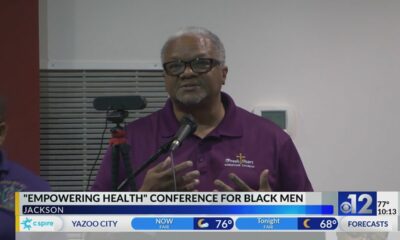Mississippi Today
Solar energy company threatens to sue Tate Reeves campaign for airing ‘defamatory’ TV ad

Employees of a company that Republican Gov. Tate Reeves' campaign accused in a TV ad of illegally donating to his Democratic opponent, Brandon Presley, is threatening to sue the governor's campaign if it doesn't take the ad off the air.
Jackson-based attorney William Manuel wrote a letter on behalf of solar energy company Silicon Ranch to Reeves campaign manager Elliott Husbands, saying the ad contains audio “falsely accusing” employees of the energy company of breaking the law.
“In consideration of the foregoing, should you fail to immediately cease broadcasting, publishing, and promoting the subject of the advertisement, Silicon Ranch will pursue all available legal remedies to cease the publication of this defamatory advertisement, including seeking injunctive relief and damages for the continued improper publishing and broadcasting of the advertisement,” Manuel wrote.
READ MORE: The full cease-and-desist letter the Reeves campaign received
The ad in question aired on Oct. 6 and accused Presley, north Mississippi's current public service commissioner, of illegally accepting campaign contributions from employees of the Tennessee-based company that does business in Mississippi. Presley has denied his campaign ran afoul of state campaign finance law with the donations.
The basis for Reeves' ad revolves around a statute that forbids public service commissioners, who regulate public utilities, from taking campaign donations from representatives of public utilities the commission is responsible for regulating.
But Manuel contends in the letter that Silicon Ranch, a producer of of solar energy, is not considered a public utility under Mississippi law, which would, in theory, clear the way for Presley to accept those donations legally.
Clifton Carroll, a Reeves spokesman, told Mississippi Today in a statement that Manuel's letter shows Reeves and the Silicon Ranch donors are “afraid of being caught using campaign donations to corruptly influence PSC actions.”
“…When applying the law and the facts to the matter at hand, it is unlawful for Brandon Presley to accept campaign contributions from any agent of the Corporation,” Carroll said. “And that's exactly what Brandon Presley did.”
The cease and desist letter cites a 2017 order that was approved unanimously by the three-member Public Service Commission. The order was based on the findings of the Public Service Commission staff, which is independent of the commission itself. The director of the PSC staff was appointed by then-Gov. Phil Bryant.
The order states: “Petitioner Silicon Ranch is not a public utility and the project is not utility property under the laws of the state of Mississippi. It is further ordered that petitioner Silicon Ranch is not subject to the Commission's jurisdiction except for the requirement of obtaining a certificate of public convenience and necessity.”
The order gave Silicon Ranch the authority to generate and sell electricity generated at a site in Lauderdale County to Mississippi Power, a public utility. Silicon Ranch was not providing electricity to the general public.
The Reeves campaign ads accusing Presley and Silicon Ranch of violating state law have run extensively across the state for several days. The cease-and-desist letter also was sent to Mississippi and Memphis television stations. But as of Wednesday morning, the ad was still airing.
If the solar company does follow through with legal action against the governor's campaign, it could mean they will have to spend money defending the ad in court and prove the contents were not defamatory.
Reeves and Presley will compete against one another in the state's general election on Nov. 7.
This article first appeared on Mississippi Today and is republished here under a Creative Commons license.
Mississippi Today
On this day in 1961
MAY 20, 1961

A white mob of more than 300, including Klansmen, attacked Freedom Riders at the Greyhound Bus Station in Montgomery, Alabama. Future Congressman John Lewis was among them.
“An angry mob came out of nowhere, hundreds of people, with bricks and balls, chains,” Lewis recalled.
After beating on the riders, the mob turned on reporters and then Justice Department official John Seigenthaler, who was beaten unconscious and left in the street after helping two riders.
“Then they turned on my colleagues and started beating us and beat us so severely, we were left bloodied and unconscious in the streets of Montgomery,” Lewis recalled.
As the mob headed his way, Freedom Rider James Zwerg said he asked for God to be with him, and “I felt absolutely surrounded by love. I knew that whether I lived or died, I was going to be OK.”
The mob beat him so badly that his suit was soaked in blood.
“There was nothing particularly heroic in what I did,” he said. “If you want to talk about heroism, consider the Black man who probably saved my life. This man in coveralls, just off of work, happened to walk by as my beating was going on and said ‘Stop beating that kid. If you want to beat someone, beat me.' And they did. He was still unconscious when I left the hospital.”
To quell the violence, Attorney General Robert Kennedy sent in 450 federal marshals.
This article first appeared on Mississippi Today and is republished here under a Creative Commons license.
Mississippi Today
2024 Mississippi legislative session not good for private school voucher supporters
Despite a recent Mississippi Supreme Court ruling allowing $10 million in public money to be spent on private schools, 2024 has not been a good year for those supporting school vouchers.
School-choice supporters were hopeful during the 2024 legislative session, with new House Speaker Jason White at times indicating support for vouchers.
But the Legislature, which recently completed its session, did not pass any new voucher bills. In fact, it placed tighter restrictions on some of the limited laws the state has in place allowing public money to be spent on private schools.
Notably, the Legislature passed a bill that provides significantly more oversight of a program that provides a limited number of scholarships or vouchers for special-needs children to attend private schools.
Going forward, thanks to the new law, to receive the vouchers a parent must certify that their child will be attending a private school that offers the special needs educational services that will help the child. And the school must report information on the academic progress of the child receiving the funds.
Also, efforts to expand another state program that provides tax credits for the benefit of private schools was defeated. Legislation that would have expanded the tax credits offered by the Children's Promise Act from $8 million a year to $24 million to benefit private schools was defeated. Private schools are supposed to educate low income students and students with special needs to receive the benefit of the tax credits. The legislation expanding the Children's Promise Act was defeated after it was reported that no state agency knew how many students who fit into the categories of poverty and other specific needs were being educated in the schools receiving funds through the tax credits.
Interestingly, the Legislature did not expand the Children's Promise Act but also did not place more oversight on the private schools receiving the tax credit funds.
The bright spot for those supporting vouchers was the early May state Supreme Court ruling. But, in reality, the Supreme Court ruling was not as good for supporters of vouchers as it might appear on the surface.
The Supreme Court did not say in the ruling whether school vouchers are constitutional. Instead, the state's highest court ruled that the group that brought the lawsuit – Parents for Public Schools – did not have standing to pursue the legal action.
The Supreme Court justices did not give any indication that they were ready to say they were going to ignore the Mississippi Constitution's plain language that prohibits public funds from being provided “to any school that at the time of receiving such appropriation is not conducted as a free school.”
In addition to finding Parents for Public Schools did not have standing to bring the lawsuit, the court said another key reason for its ruling was the fact that the funds the private schools were receiving were federal, not state funds. The public funds at the center of the lawsuit were federal COVID-19 relief dollars.
Right or wrong, The court appeared to make a distinction between federal money and state general funds. And in reality, the circumstances are unique in that seldom does the state receive federal money with so few strings attached that it can be awarded to private schools.
The majority opinion written by Northern District Supreme Justice Robert Chamberlin and joined by six justices states, “These specific federal funds were never earmarked by either the federal government or the state for educational purposes, have not been commingled with state education funds, are not for educational purposes and therefore cannot be said to have harmed PPS (Parents for Public Schools) by taking finite government educational funding away from public schools.”
And Southern District Supreme Court Justice Dawn Beam, who joined the majority opinion, wrote separately “ to reiterate that we are not ruling on state funds but American Rescue Plan Act (ARPA) funds … The ARPA funds were given to the state to be used in four possible ways, three of which were directly related to the COVID -19 health emergency and one of which was to make necessary investments in water, sewer or broadband infrastructure.”
Granted, many public school advocates lamented the decision, pointing out that federal funds are indeed public or taxpayer money and those federal funds could have been used to help struggling public schools.
Two justices – James Kitchens and Leslie King, both of the Central District, agreed with that argument.
But, importantly, a decidedly conservative-leaning Mississippi Supreme Court stopped far short – at least for the time being – of circumventing state constitutional language that plainly states that public funds are not to go to private schools.
And a decidedly conservative Mississippi Legislature chose not to expand voucher programs during the 2024 session.
This article first appeared on Mississippi Today and is republished here under a Creative Commons license.
Mississippi Today
On this day in 1925


MAY 19, 1925

Malcolm X was born Malcolm Little in Omaha, Nebraska. When he was 14, a teacher asked him what he wanted to be when he grew up and he answered that he wanted to be a lawyer. The teacher chided him, urging him to be realistic. “Why don't you plan on carpentry?”
In prison, he became a follower of Nation of Islam leader Elijah Muhammad. In his speeches, Malcolm X warned Black Americans against self-loathing: “Who taught you to hate the texture of your hair? Who taught you to hate the color of your skin? Who taught you to hate the shape of your nose and the shape of your lips? Who taught you to hate yourself from the top of your head to the soles of your feet? Who taught you to hate your own kind?”
Prior to a 1964 pilgrimage to Mecca, he split with Elijah Muhammad. As a result of that trip, Malcolm X began to accept followers of all races. In 1965, he was assassinated. Denzel Washington was nominated for an Oscar for his portrayal of the civil rights leader in Spike Lee's 1992 award-winning film.
This article first appeared on Mississippi Today and is republished here under a Creative Commons license.
Did you miss our previous article…
https://www.biloxinewsevents.com/?p=359877
-
Our Mississippi Home7 days ago
Beat the Heat with Mississippi’s Best Waterparks
-
SuperTalk FM4 days ago
State auditor cracking down on Mississippians receiving unemployment benefits
-
Mississippi News Video6 days ago
Jackson has a gang problem
-
Kaiser Health News7 days ago
Medicaid ‘Unwinding’ Decried as Biased Against Disabled People
-
Local News3 days ago
Family files lawsuit after teen’s suicide in Harrison County Jail
-
Mississippi Today5 days ago
On this day in 1950
-
228Sports6 days ago
George County Pours Runs In 6A South State Title Victory At PRC
-
Local News Video5 days ago
In the Kitchen with J's Restaurant








































